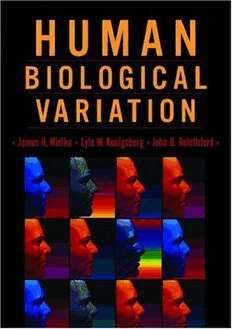
Human Biological Variation PDF
434 Pages·2005·11.537 MB·English
Most books are stored in the elastic cloud where traffic is expensive. For this reason, we have a limit on daily download.
Preview Human Biological Variation
Description:
This text explores human biological variation in its broadest sense--from the molecular to the physiological and morphological--focusing on the micro-evolutionary analysis of genetic variation among recent human populations. Authoritative yet accessible, Human Biological Variation opens with an introduction to basic genetics and the evolutionary forces that set the stage for understanding human diversity. It goes on to offer a detailed and clear discussion of molecular genetics and its uses and relationship to anthropological and evolutionary models. The text features up-to-date discussions of "classic" genetic markers (blood groups, enzymes, and proteins), along with extensive background on DNA analysis and detailed coverage of satellite DNA, single nucleotide polymorphisms (SNPs), Alu inserts, and the coalescent model. The book addresses such current issues as the meaning and significance of "race," quantitative genetics and the "nature versus nurture" debates, biocultural interactions, population structure, and cultural and historical influences on patterns of human variation. Human Biological Variation lucidly explains the use of probability and statistics in studies of human variation and adaptation, keeping the mathematics at the level of basic algebra. It also presents computer simulations in a manner that makes complex issues easily understandable. Integrating examples on topics that are of particular interest to students--including dyslexia, IQ, and homosexuality--Human Biological Variation provides the most thorough thorough view of our biological diversity and is ideal for upper-level undergraduate and graduate classes on human adaptation and variation.
See more
The list of books you might like
Most books are stored in the elastic cloud where traffic is expensive. For this reason, we have a limit on daily download.
